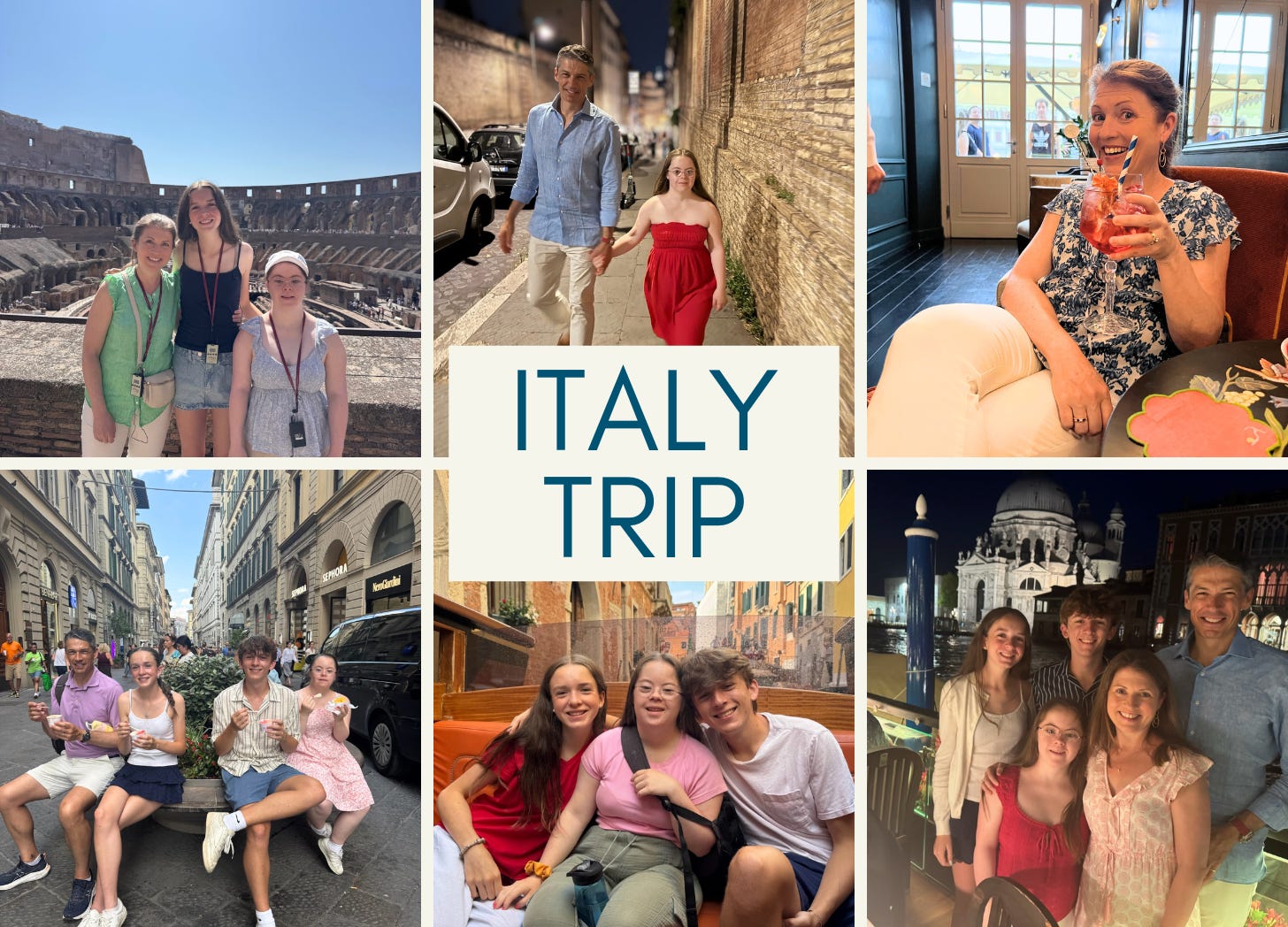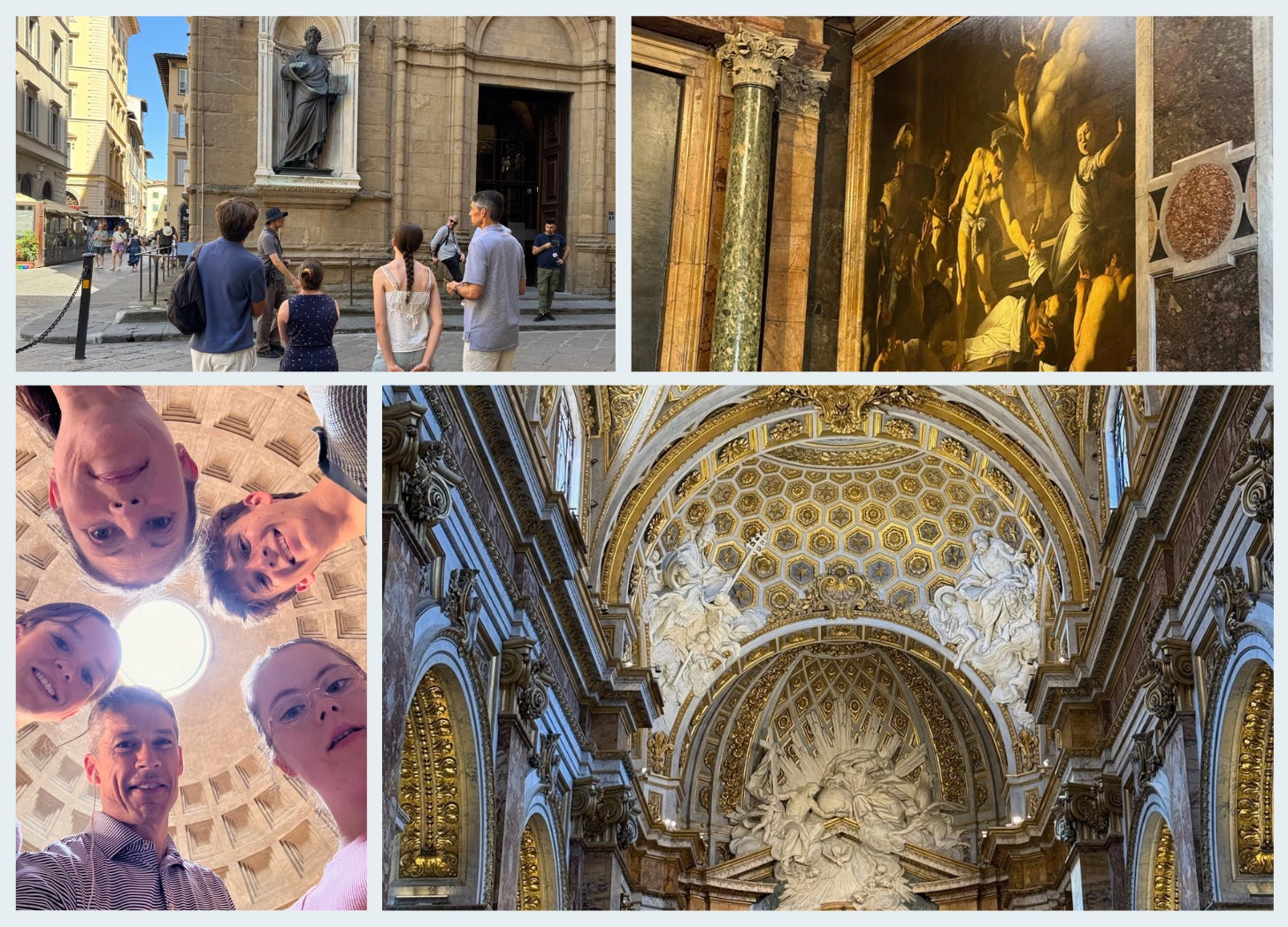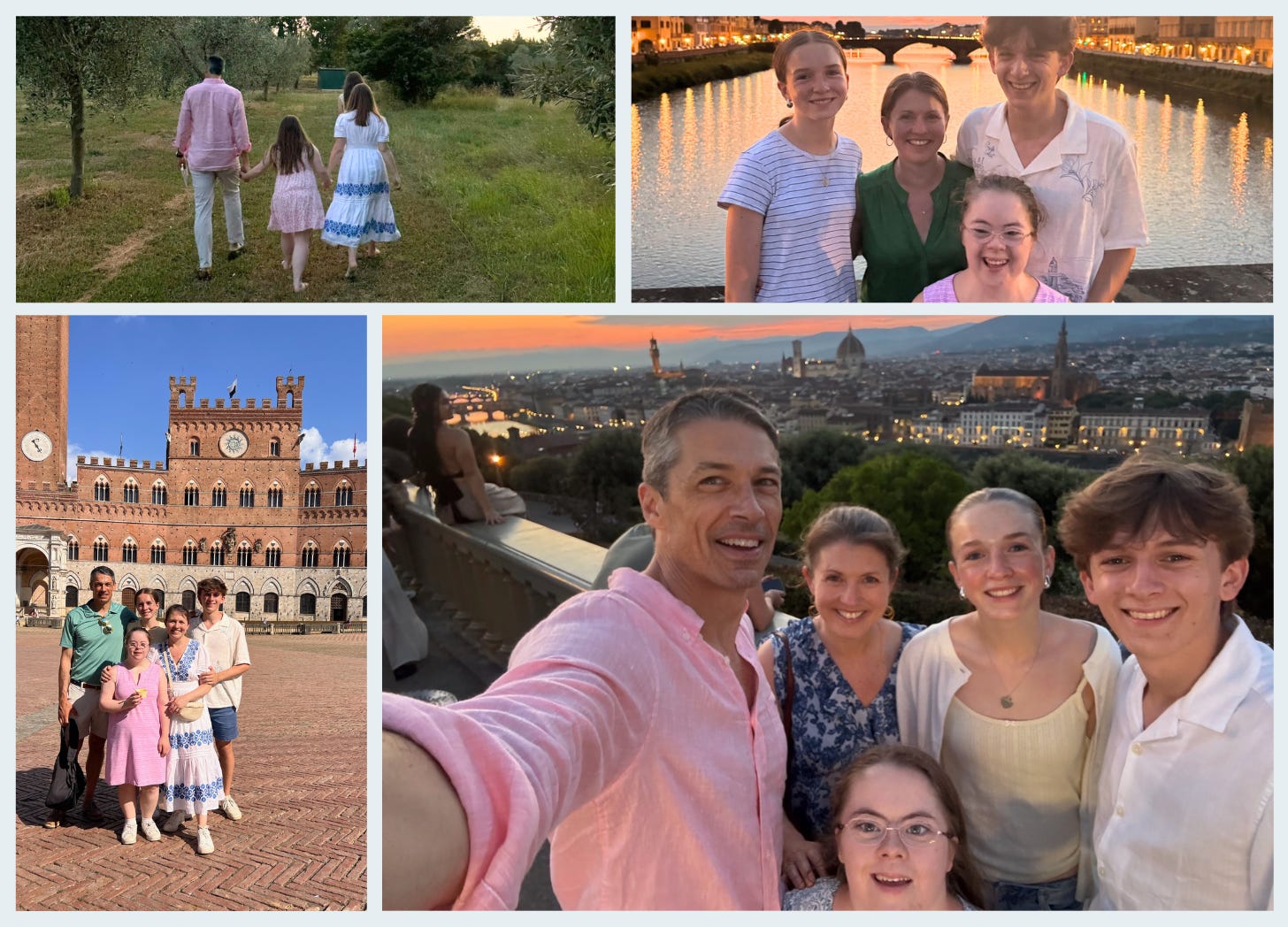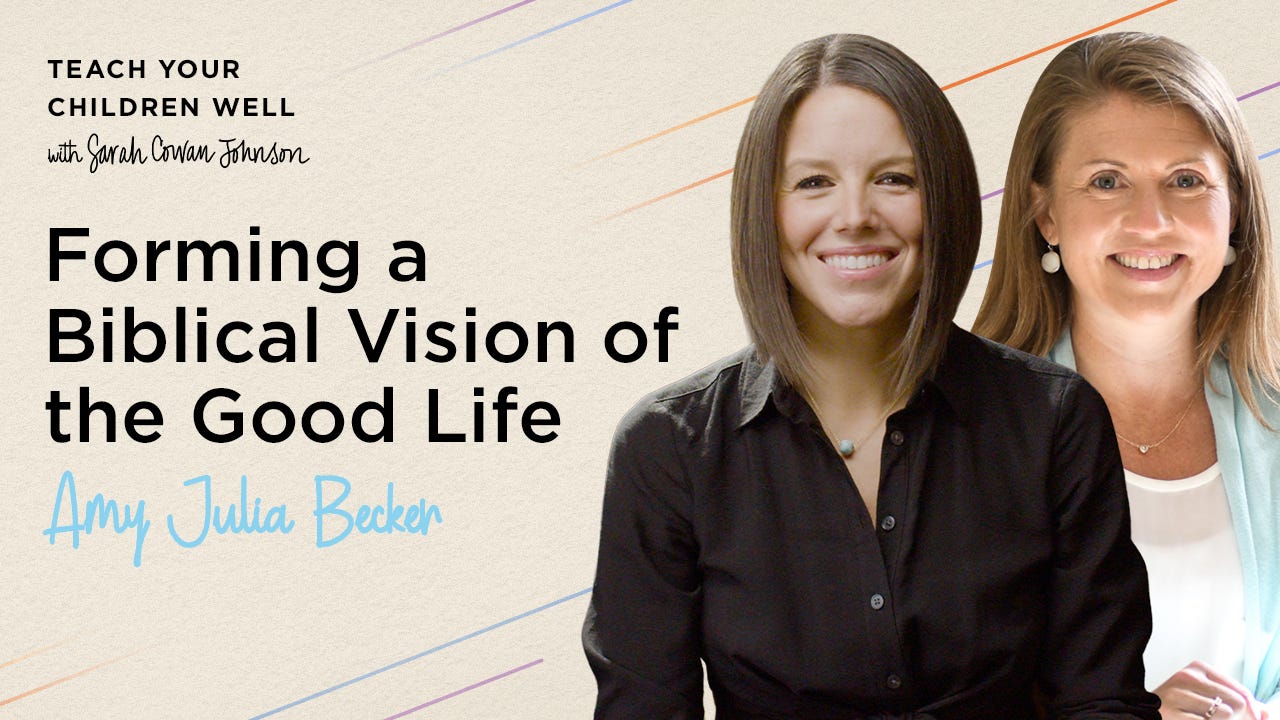Assumptions Without Curiosity
Our trip to Italy offered beauty, history—and an unexpected lesson on how we see one another. {Plus 5 things worth your time and 1 thing I'm pondering}
We just returned from two weeks in Italy as a family. It held all the things we had hoped for. We peeked into churches with some of my favorite Caravaggio paintings and talked for a long time about Michelangelo’s David and whether or not there is such a thing as “genius.” We climbed towers and stood inside Etruscan tombs and rode in a water taxi in Venice. We ate our way through each city, but also walked nearly 20,000 steps each day. The cheese and bread and olive oil and wine and daily afternoon snack of gelato fueled us well. And we laughed together. What a gift.
But there were a few moments that interrupted the feeling of being anonymous Americans just enjoying the standard tourist attractions.
Assumptions Without Curiosity
We were standing in line for the Vatican when a man approached Peter and said, “You know, special children get in for free.” He said it loudly, and he pointed at Penny. He went on to insist that we get a refund for her ticket.
Penny immediately turned away and looked down. We were all a little taken aback by the exchange. On the one hand, we applaud policies and programs that signal welcome and support for disabled people and their families. On the other, as Penny said later, “I didn’t like that he talked about me with Dad instead of talking to me. And I didn’t like that he did it so publicly.”
As the trip progressed, there were other little indications that people didn’t see Penny in the same way that they saw Marilee and William. Those little exchanges can be summed up by the waiter who removed a wine glass from Penny’s place setting (note: she’s the 19-year-old, who legally could drink wine in Italy), but offered wine to Marilee (14) and William (16).
Our friend Katherine Wolf, co-founder of Hope Heals, talks about having “curiosity without assumptions” when it comes to disability.
Curiosity without assumptions = welcome, insight, connection
Assumptions without curiosity = stereotypes, exclusion, dehumanization
We realized at the end of the trip that many people treated Penny with “assumptions without curiosity.” She doesn’t mind people noticing that she has Down syndrome. We understand people might wonder whether she has particular needs or limitations when it comes to mobility or communication. But it’s a problem when everyone assumes that she can’t order her own dinner or speak for herself or ask questions or drink wine. Curiosity isn’t a problem, but assumptions without curiosity sting.
Assumptions without curiosity lead to stereotypes and dehumanization. Instead of seeing Penny as a particular individual, she is not really seen at all.
Renaissance Art and Curiosity
Over the course of our time in Tuscany, we looked at paintings that show the transition from the Byzantine period through the Renaissance. From flat, standard, idealized forms to the faces of real humans with emotions and distinctiveness. The Renaissance artists became curious. And what they were able to offer in return for that curiosity was creativity, beauty, and an explosion of color and insight and truth about the human soul.
We return from our trip filled with gratitude, for the time together and the experience of places with thousands of years of history and, yes, again, the gelato. But we also return especially grateful for the people—both past and present, both here and abroad—who are curious without assumptions and the ways that curiosity leads to creativity, beauty, generosity, and care.
When have you noticed yourself shifting from assumption to curiosity? What made the difference? I’d love to hear from you!
-Amy Julia
P.S. Keep scrolling for 5 things worth your time, plus what I’m pondering these days.
Reminder!
Get your free download: 30 Next Steps for Parents… for when you feel overwhelmed by all the things you could be doing to support your kids.
Forming a Biblical Vision of the Good Life with Amy Julia Becker
Grateful for this conversation and the awesome questions asked by Sarah Cowan Johnson.
5 Things Worth Your Time
NOVEL: How to Read a Book: A Novel
One of you recommended this to me, and I loved it, so thank you! It tells the story of a women’s book club—in prison. You can probably imagine the humanity that comes forth in this setting, so I won’t say anything more except to commend this book as a sweet, thoughtful story about reckoning with our mistakes and bad choices and living with hope and forgiveness.
TV SERIES: Andor
We just finished season 1 of Andor, and it lived up to the hype. I am not a big Star Wars fan, but this prequel to the Star Wars franchise offers a thought-provoking meditation on human freedom. There’s complexity in the characters—the bureaucrats working for the Empire sometimes think they are doing everything in the name of what is good and true, and the rebels run the gamut from quiet resistance from inside the system and those seeking to overthrow it from the outside looking in. I started watching Andor on
’s recommendation, so read his Substack here for more on why this show matters in our time.RESOURCE: How to Slow Down and Be a Peaceful Presence When Tensions Are High
This short, thoughtful guide is all about how to slow down and stay grounded when tensions run high.
ESSAY: “Why Evangelicals Turned Their Back on PEPFAR”
I am still saddened by the Trump administration’s decision to effectively end PEPFAR, the program that saved tens of millions of lives in this century. And after reading Peter Wehner’s account of why evangelical Christians have failed to protest its demise, I’m not only saddened but angered. We don't want to be the ones who walk to the other side of the road when we see our brothers and sisters in need.
NYT ESSAY: “Autism Rates Have Increased 60-Fold. I Played a Role in That.”
I appreciated this succinct history of the way clinicians diagnose autism spectrum disorder and how these changes have led to the increase in both helpful and false diagnoses.
1 Thing I’m Pondering
Implications of the “Big, Beautiful Bill”
As we return from vacation and I get back up to speed on the news, I’m trying to wrap my head around the implications of the “Big, Beautiful Bill” that just passed through Congress. One thing I know is that it puts more vulnerable people at risk through cuts to Medicaid, and it increases the financial advantages for wealthy people. I’m someone who stands to benefit individually from this recent legislation, and yet I see this bill as a loss personally and collectively because it does not seek the common good.
I’ve been reading Walter Brueggemann’s Money and Possessions, and it has helped me recognize the ways I am caught up in our market economy, and also what it might look like to lovingly resist the assumptions of this zero-sum game.
As Brueggemann writes:
“piety can imagine an alliance between the needy poor who refuse to be submissively silent in a context of exploitation and the prosperous wealthy who refuse to be defined by their wealth.”
He urges us to be defined not by our wealth (or poverty), not by our power or exploitation, but rather by love of our neighbor and an insistence that when we live with generosity, we all benefit.
Okay, but what does this have to do with political legislation, tax reform, and Medicaid? I’m still working that out, but one thought I’ve had is that even if our government is not approaching the economy from a perspective of abundant generosity that benefits all, we as individuals and we within our local communities can still live with this posture.
One way that people will be denied Medicaid coverage, for instance, is through cumbersome paperwork requirements. What if churches and other civic organizations offered free clinics to help people navigate that paperwork? Or what if people like me—who receive a tax break through this legislation—look for ways to invest what would have been paid in taxes in opportunities for more vulnerable people to flourish?
I’m sure there are other ways we can participate in an economy of neighbor love instead of exploitation. I’d love to hear any ideas you might have too.
What are you reading, watching, or listening to these days?
🎙Listen to the podcast Apple | Spotify | YouTube | More
📰 Miss a week? Read past newsletters here.
📧 Questions or feedback? Leave a comment. I read every comment and email reply from you!
As an Amazon Associate, I earn from qualifying purchases. So, if you use a link from here to purchase something I recommend, it sometimes earns me a small commission, which enables me to continue the work I do here. Thank you!






I really like your suggestions about "sharing the wealth" of tax breaks and evening things out. One of the reasons that my co-founder and I started Breadcoin, which ensures that people are fed with dignity through a food token used at local restaurants, is that so many people care that others are hungry but just don't meet the hungry personally. Our system was created in response to asking our own version of your questions because we felt like a creative solution was needed to share the wealth. Regular people who can afford to make sure that others are getting food, especially when benefits are being cut. (I hesitated to share this, loathing using a comment sections for promoting anything, but it does feel like an answer to your question.)
I look forward to reading more creative ideas. Good conversation.